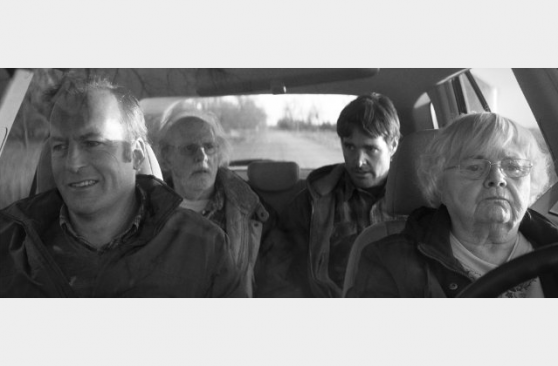Nebraska: Dreams from his father

Photo: Paramount
Woody Grant (Bruce Dern), a disheveled and mulishly taciturn alcoholic, is determined to get from Billings, MT to Lincoln, NE to collect the magazine sweepstakes he’s sure he’s won. It’s just a promotional letter, of course, but Woody’s going, whether his family likes it or not. They very much don’t, but his younger son David (Will Forte) decides to humor him (or mitigate any number of potential disasters; Woody can no longer drive, and is pinched in the very first scene for walking on the highway shoulder). It’s a road trip; David believes in the bonding power of the road trip, that he can get to know his father or impress him some way.
As it turns out…as everyone but David probably has understood for some time…there isn’t much to know, nobody really to impress, and when Nebraska is able to be with that grave disappointment quietly, it’s a nice little picture. Dern’s performance is probably overpraised somewhat, but still very good, restrained. Fictional narrative is not generally a fan of the idea that still waters don’t always run deep, and “sometimes a man just has nothing to say” is not the easiest acting brief, but it’s well done by Dern and a bold choice by writer Bob Nelson.
That said, I don’t know if it warrants a feature. First, while Forte is good in the front end, almost eagerly interviewing Woody about his life and his motivations in the hopes that his father did have a grand plan or was the victim of some mythic turn, I don’t entirely buy the tone of their relationship, which suggests that they’ve never met before when this family of origin all lives in the same place. Second, some of the dialogue nuggets seem saved up and stale, like “Beer ain’t drinkin'” and the running gag about how who drives what car is all the old men have to talk about.
Third, Nelson and director Alexander Payne fill the rest of the time with cut-rate-Fargo cartoons of small-town Nebraskans — nosy, avaricious, nearly on the spectrum in their preoccupations. Stacy Keach as bully Ed Pegram gives it his best, but the film’s choice to have him sing Elvis’s earnestly embarrassing “In The Ghetto” at karaoke is so arch, it’s nearly a pretzel…and unfortunately for Nebraska, it recalls another karaoke scene set in Nebraska, the autopilot longing of Chloe Sevigny’s Lana Tisdel in Boys Don’t Cry, that communicated karaoke’s frequent pathos without dismissing the characters. Payne returns over and over to Nebraska, uses the locals as actors, and is open about his unfinished psychological business with the place, which is fine. But either he feels no affection for Nebrask-ans, or he can’t bring himself to admit it, and it curdles the whole story. June Squibb as Kate, David’s mother and Woody’s wife, is handy with the bales of family-tree exposition she’s having to throw off the truck, and while she’s a type — impatient; elephantine in her recall of neighborly trivia — she’s interesting. Then she flashes a gravestone. The compulsive need to dismiss these people as nightmarish grotesques isn’t interesting at all.
It’s better than The Descendants, at least, less self-regarding and cheap. It has a handful of good bits, like the shot of the cousins “hiding” melodramatically around a corner. It also has a handful of regrettable bits (David turns back around to punch Stacy Keach in the face, a misread of what the audience would want for David that’s also out of character) and should probably have made the entire Woody/road trip plot a C-story in a film about older brother Ross (Bob Odenkirk). Nebraska at its best isn’t actually about much, in a nervy way, but it wimps out and fills in the space with caricatures and old people saying dirty words. Not great, Bob.
Tags: Alexander Payne Bob Nelson Bob Odenkirk Bruce Dern Chloe Sevigny June Squibb movies Nebraska small-town-ism Stacy Keach Will Forte





(er… mild Breaking Bad spoilers?):
So *that’s* where Saul Goodman ended up after the vacuum cleaner repair…
(Sorry, I had to…)